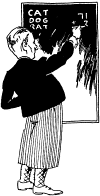Search us!
Search The Word Detective and our family of websites:
This is the easiest way to find a column on a particular word or phrase.
To search for a specific phrase, put it between quotation marks. (note: JavaScript must be turned on in your browser to view results.)
Ask a Question! Puzzled by Posh?
Confounded by Cattycorner?
Baffled by Balderdash?
Flummoxed by Flabbergast?
Perplexed by Pandemonium?
Nonplussed by... Nonplussed?
Annoyed by Alliteration?

Don't be shy!
Send in your question!
Columns from 1995 to 2006 are slowly being added to the above archives. For the moment, they can best be found by using the Search box at the top of this column.
 If you would like to be notified when each monthly update is posted here, sign up for our free email notification list.
If you would like to be notified when each monthly update is posted here, sign up for our free email notification list.
Trivia
All contents herein (except the illustrations, which are in the public domain) are Copyright © 1995-2020 Evan Morris & Kathy Wollard. Reproduction without written permission is prohibited, with the exception that teachers in public schools may duplicate and distribute the material here for classroom use.
Any typos found are yours to keep.
And remember, kids,
Semper Ubi Sub Ubi
|
When “final” means truly finished.
Dear Word Detective: A group of friends and I were wondering about the etymology of “flunk,” as in to “flunk out” or to “flunk a course.” (The more I say it the weirder the word sounds.) Anyway, the usual sources say the origin is unknown, but I like to hear your theories on the matter. No pressure, of course! –Jenny Nunemacher.
No problem. I’ve never had fear of flunking. In fact, I’m the only person I know who has never had one of those dreams where you walk into a college class you’ve neglected to attend all semester and discover that the final exam is being held. Perhaps I was immunized by having it happen in real life.
 To “flunk,” of course, means “to fail,” specifically “to fail utterly” and often “to fail spectacularly.” “Flunk” is usually used in academic contexts, although real-world uses are also common (“Lenny was cute but he flunked the not-living-in-his-parents’-basement test”). To “flunk,” of course, means “to fail,” specifically “to fail utterly” and often “to fail spectacularly.” “Flunk” is usually used in academic contexts, although real-world uses are also common (“Lenny was cute but he flunked the not-living-in-his-parents’-basement test”).
It is true that “the usual sources” (most dictionaries) label “flunk” as “origin unknown,” but it would be more accurate to tag the word “origin uncertain.” We do know that “flunk” first appeared as US slang in the early 19th century with the general, non-academic sense of “to give up, to back out, to fail” (“They were, of course, exposed to the fire of the red-coats … but they didn’t flunk a bit,” 1850).
But “flunk” may well be a relic of 18th century college slang, inherited from our cousins across the pond. “Flunk” appears to be a modification of the verb “to funk,” British university slang meaning “to flinch or cower, to back out of,” based on the noun “funk” meaning “distress,” possibly derived from the Flemish word “fonck” meaning “agitation; distress.” There may also be a bit of the old American slang verb “to flink,” a variant of “to flinch,” mixed in there.
That noun “funk” is still very much with us, and we speak of someone sunk in a state of depression and anxiety as being “in a funk.” But the “funk” found in “funky” is, thankfully, from an entirely different “funk,” this one originally meaning “bad smell,” specifically a musty or moldy smell, or a smell of smoke (from the Old French “fungier,” to give off smoke”). In the early 20th century, “funky” was taken up by jazz musicians to mean “authentic, earthy, passionate.” So while “funky” cheese remains a bad thing, we can appreciate the beauty of “funky” music.
Patients of Jobs.
Dear Word Detective: I grew up (in the northeast) with my dad using the word “finagle” quite liberally and usually in reference to how he cleverly obtained something. I’ve found the word in the dictionary, however have not been able to come up with the origin of the word. Any ideas? — Wayne Kulick.
 Ideas? I don’t fiddle with “ideas,” buckaroo. I deal with cold, hard facts. If it’s “ideas” you want, drop a line to that “creative” crowd at Apple. They could probably whip up an “iOrigin” for you with sleek, rounded contours and the voice of Bono making the Indo-European roots sound like Celtic poetry. But then the battery would die, and you’d have to take it to an Apple Store and endure the sneers of the trendoid twits in the black t-shirts. So you’re better off with me. Ideas? I don’t fiddle with “ideas,” buckaroo. I deal with cold, hard facts. If it’s “ideas” you want, drop a line to that “creative” crowd at Apple. They could probably whip up an “iOrigin” for you with sleek, rounded contours and the voice of Bono making the Indo-European roots sound like Celtic poetry. But then the battery would die, and you’d have to take it to an Apple Store and endure the sneers of the trendoid twits in the black t-shirts. So you’re better off with me.
“Finagle” is a fine old word, and, as a native of the northeastern US myself, I remember my parents using it as well. According to the Dictionary of American Regional English (DARE), “finagle” is actually in widespread use throughout the US, and is spelled a variety of ways, including “fanigle,” “finigal,” and, presumably among the high-falutin’ crowd, “phenagle.”
The Oxford English Dictionary defines “finagle” as “To use dishonest or devious methods to bring something about; … to scheme, to get (something) by trickery.” The American Heritage Dictionary is similarly disapproving: “To obtain or achieve by indirect, usually deceitful methods… to cheat; swindle.”
But while the element of outright dishonesty is definitely sometimes part of “finagling,” I would suggest that the usual use of the word carries the implication of bending, perhaps twisting, but not breaking the rules. Crooked stockbrokers may “finagle” with schemes that pauperize their clients, but your average “finagler” is just looking for an angle, an insider’s discount on storm windows or use of the company truck after work. “Finagle” to me is about clever persuasion, not vulgar fraud.
As is so often the case with colorful words, the exact origin of “finagle,” which first appeared in American English in the 1920s, is a bit cloudy. It has been traced to the old English dialect word “fainaigue,” meaning “to cheat, renege (especially in a card game) or to shirk work,” but at that point the trail goes cold. An English word similar in meaning and superficially similar in form, “faineant” (meaning “one who does nothing, an idler”), derives from an old French compound of “fait” (“he does”) and “neant” (“nothing”), so there may be a clue there. It’s also interesting that the original spelling of “renege” (from the Latin “re,” again, plus “negare,” to deny) in English was “reneague,” which might imply that “fait” plus “neague” (perhaps adding up to “he reneges”) might be hiding somewhere in the family tree of “finagle.”
A favorite of people who actually say “eschew.”
Dear Word Detective: So I am sitting with my sister-in-law and made a comment about the word “distaff.” She said she never heard of it and I explained the definition, but realized it is a strange word. Where did that term come from? — Bob M.
 I agree that “distaff” is a strange word, and I’ll raise you by saying that I have always found it a deeply creepy word. As a term meaning “of or pertaining to the female realm,” it’s right up there with “little lady” and “better half” in my book. To me, “distaff” reeks of lame greeting cards, smarmy sportscasters, and faux-macho intellectuals who call their girlfriends “my lady.” “Distaff” is strange uncles in musty cardigans sucking Sen-Sen while they ask you how school is going, unfunny Reader’s Digest jokes, and public-radio pedants. “Distaff” is claustrophobic, cutesy and vaguely menacing all at once. It’s a Ned Flanders word, a Lawrence Welk locution, and it gives me the wimwams. Can we pick a different word? I agree that “distaff” is a strange word, and I’ll raise you by saying that I have always found it a deeply creepy word. As a term meaning “of or pertaining to the female realm,” it’s right up there with “little lady” and “better half” in my book. To me, “distaff” reeks of lame greeting cards, smarmy sportscasters, and faux-macho intellectuals who call their girlfriends “my lady.” “Distaff” is strange uncles in musty cardigans sucking Sen-Sen while they ask you how school is going, unfunny Reader’s Digest jokes, and public-radio pedants. “Distaff” is claustrophobic, cutesy and vaguely menacing all at once. It’s a Ned Flanders word, a Lawrence Welk locution, and it gives me the wimwams. Can we pick a different word?
OK, rant over. We must be scientific. Well, “distaff” certainly has a bit of interesting history to it. It first appeared in English around the year 1000, and crops up in both Chaucer’s Canterbury Tales and several of Shakespeare’s plays. Though not as popular as it once was, “distaff” still gets more than one-half million hits on Google.
The “staff” of “distaff” is just that, a long staff with a cleft end. In the Middle Ages weaving was an important home industry, and the purpose of the “distaff” was to hold the wool or flax (“dis” or “dise”) and prevent it from tangling as it was drawn into the loom. As women did almost all the spinning in those days, by the late 14th century the “distaff” had become an emblem of women’s place in the social order, and in a marriage the woman’s family became known as “the distaff side.” Interestingly, there was no corresponding term in English for the groom’s family until the 19th century, when “spear side” and “sword side” (imported from German) became briefly popular.
“Distaff” became weirdly popular in mass media in the mid-20th century, but began to fade in the late 1960s when the practice of labeling half the human race with a word drawn from medieval menial labor began to strike a lot of folks as obnoxious. Of course, that perception might have come a bit sooner if men had been saddled with a similarly demeaning term from the git-go (perhaps “the sweaty side” or “the hog-herder side”).
One of the last holdouts of “distaff” in common use is the world of horse racing, where races composed only of female horses are known as “distaffs.” And “Sen-Sen,” in case you’re wondering, is a “breath freshening product” first produced in the late 19th century and still sold to strange uncles today.
|
Makes a great gift! Click cover for more.  
400+ pages of science questions answered and explained for kids -- and adults!
FROM ALTOIDS TO ZIMA, by Evan Morris
 
|
 To “flunk,” of course, means “to fail,” specifically “to fail utterly” and often “to fail spectacularly.” “Flunk” is usually used in academic contexts, although real-world uses are also common (“Lenny was cute but he flunked the not-living-in-his-parents’-basement test”).
To “flunk,” of course, means “to fail,” specifically “to fail utterly” and often “to fail spectacularly.” “Flunk” is usually used in academic contexts, although real-world uses are also common (“Lenny was cute but he flunked the not-living-in-his-parents’-basement test”).

 can be found
can be found 
 Ideas? I don’t fiddle with “ideas,” buckaroo. I deal with cold, hard facts. If it’s “ideas” you want, drop a line to that “creative” crowd at Apple. They could probably whip up an “iOrigin” for you with sleek, rounded contours and the voice of Bono making the Indo-European roots sound like Celtic poetry. But then the battery would die, and you’d have to take it to an Apple Store and endure the sneers of the trendoid twits in the black t-shirts. So you’re better off with me.
Ideas? I don’t fiddle with “ideas,” buckaroo. I deal with cold, hard facts. If it’s “ideas” you want, drop a line to that “creative” crowd at Apple. They could probably whip up an “iOrigin” for you with sleek, rounded contours and the voice of Bono making the Indo-European roots sound like Celtic poetry. But then the battery would die, and you’d have to take it to an Apple Store and endure the sneers of the trendoid twits in the black t-shirts. So you’re better off with me. I agree that “distaff” is a strange word, and I’ll raise you by saying that I have always found it a deeply creepy word. As a term meaning “of or pertaining to the female realm,” it’s right up there with “little lady” and “better half” in my book. To me, “distaff” reeks of lame greeting cards, smarmy sportscasters, and faux-macho intellectuals who call their girlfriends “my lady.” “Distaff” is strange uncles in musty cardigans sucking Sen-Sen while they ask you how school is going, unfunny Reader’s Digest jokes, and public-radio pedants. “Distaff” is claustrophobic, cutesy and vaguely menacing all at once. It’s a Ned Flanders word, a Lawrence Welk locution, and it gives me the wimwams. Can we pick a different word?
I agree that “distaff” is a strange word, and I’ll raise you by saying that I have always found it a deeply creepy word. As a term meaning “of or pertaining to the female realm,” it’s right up there with “little lady” and “better half” in my book. To me, “distaff” reeks of lame greeting cards, smarmy sportscasters, and faux-macho intellectuals who call their girlfriends “my lady.” “Distaff” is strange uncles in musty cardigans sucking Sen-Sen while they ask you how school is going, unfunny Reader’s Digest jokes, and public-radio pedants. “Distaff” is claustrophobic, cutesy and vaguely menacing all at once. It’s a Ned Flanders word, a Lawrence Welk locution, and it gives me the wimwams. Can we pick a different word?



Recent Comments